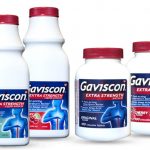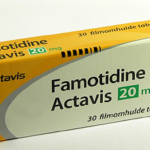Can You Take Gaviscon While Pregnant?

Indigestion also known as heartburn or acid reflux, is common in pregnancy. During normal digestion, food travels down the esophagus (the tube between your mouth and stomach), through a muscular valve called the lower esophageal sphincter (LES), and into the stomach.
The LES is part of the doorway between your esophagus and your stomach. It opens to allow food through and closes to stop stomach acids from coming back up. When you have heartburn or acid reflux, the LES relaxes enough to allow stomach acid to rise up into the esophagus. This can cause pain and burn in the chest area.
During pregnancy, hormone changes can allow the muscles in the esophagus, including the LES, to relax more frequently. The result is that more acids may seep back up, particularly when you’re lying down or after you’ve eaten a large meal.
In addition, as your fetus grows during the second and third trimesters and your uterus expands to accommodate that growth, your stomach is under more pressure. This can also result in food and acid being pushed back up into your esophagus.
What is Gaviscon?
Gaviscon is a fast-acting antacid that can lower the acidity of stomach acid. It is used for the treatment of heartburn, acid indigestion, sour stomach, or upset stomach. Gaviscon is also used to provide temporary relief from heartburn and acid indigestion caused by acid reflux.
How does Gaviscon Liquid work for heartburn, indigestion, and reflux?
Gastro-esophageal reflux (also known as heartburn or reflux) occurs when the contents of the stomach escape back up into the esophagus (food pipe). The sodium alginate in Gaviscon acts as a ‘raft’ that forms over the contents of your stomach to help relieve reflux. Gaviscon soothes and cools the esophagus, effectively relieving the classic – and often painful – symptoms of heartburn, so you can feel relief.
How long does it take for Gaviscon to work?
Gaviscon Original Liquid and Gaviscon Dual Action Liquid start to provide soothing relief from the symptoms of heartburn from as little as 4 minutes.*
Is Gaviscon safe in pregnancy?
Yes, Gaviscon is safe in pregnancy and women can take Gaviscon to relieve heartburn, indigestion, and reflux while pregnant. Antacids containing magnesium like Gaviscon are safe when used occasionally at the recommended dosage. But they’re not your best option while pregnant because they also contain aluminum hydroxide. Aluminum can be constipating and, in large doses, toxic.
Bear in mind that swallowing any liquid, even the liquid you need to wash down a tablet will cause your stomach to do what it does naturally: produce digestive juices – including acid, the very thing you’re trying to reduce. So it’s best to chew Gaviscon tablets with as little liquid as possible when you’re having trouble with heartburn.
Gaviscon work by neutralizing the acid that’s already in your stomach and causing you pain. If you’re regularly taking the recommended dosage and aren’t getting relief from heartburn, talk to your doctor or midwife about whether you can take additional or different medications.
What are the possible side effects of Gaviscon?
Gaviscon can cause the following side effects:
- Constipation
- Diarrhea
- Headache
- Nausea
If these symptoms persist or become severe, notify your doctor. If your doctor has directed you to use this medication, remember that your doctor has judged that the benefit to you is greater than the risk of side effects. Many people using this medication do not have serious side effects.
The magnesium in this product can cause diarrhea. Using an antacid that contains only aluminum along with this product can help control diarrhea. The aluminum in this product can cause constipation. To minimize constipation, drink plenty of fluids and exercise. Diarrhea is more common with this product than constipation.
Aluminum-containing antacids bind to phosphate, an important body chemical in the gut. This can cause low phosphate levels, especially if you use this medication in large doses and for a long time. Tell your doctor right away if you have any of the following symptoms of low phosphate: loss of appetite, unusual tiredness, muscle weakness.
Tell your doctor right away if any of these unlikely but serious side effects occur:
- Dizziness
- Fainting
Seek immediate medical attention if any of these rare but very serious side effects or symptoms of a serious medical problem occur:
- Black or tarry stools
- Shallow breathing
- Slow or irregular heartbeat
- Mood changes (e.g., confusion)
- Deep sleep
- Pain with urination
- Abdominal pain
- Vomit that looks like coffee grounds.
A very serious allergic reaction to this drug is rare. However, seek immediate medical attention if you notice any symptoms of a serious allergic reaction, including:
- Rash
- Itching
- Swelling (especially of the face,tongue and throat)
- Severe dizziness
- Trouble breathing
This is not a complete list of possible side effects. If you notice other effects not listed above, contact your doctor or pharmacist.
In the US – Call your doctor for medical advice about side effects. You may report side effects to FDA at 1-800-FDA-1088 or at www.fda.gov/medwatch.
In Canada – Call your doctor for medical advice about side effects. You may report side effects to Health Canada at 1-866-234-2345.





